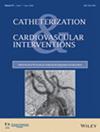Impact of Periprocedural Statin Therapy on Mortality and Cardiovascular Outcomes in Transcatheter Aortic Valve Replacement: A Meta-Analysis and Meta-Regression
Abstract
Background
Transcatheter aortic valve replacement (TAVR) stands as a notable alternative to surgical valve replacement for severe aortic stenosis (AS). Despite the established benefits of statins in cardiovascular pathologies, their specific impact in patients with severe AS undergoing TAVR remains uncertain.
Aims
Our meta-analysis aims to assess whether periprocedural statin therapy improves survival and outcomes post-TAVR, thus addressing this gap in literature.
Methods
A comprehensive literature search using various databases with relevant keywords terms was conducted to identify studies on the impact of periprocedural statin therapy on TAVR outcomes. We assessed the primary outcome of all-cause mortality alongside various secondary outcomes including stroke/transient ischemic attack (TIA), myocardial infarction, acute kidney injury (AKI), 30-day mortality, in-hospital mortality, rehospitalization, cardiovascular complications, and pacemaker requirement. A random-effects model using Comprehensive Meta Analysis Software was employed to analyze the data for each outcome. Statistical significance was set at a p < 0.05.
Results
Our analysis of 19 observational studies revealed that periprocedural statin therapy significantly reduces all-cause mortality following TAVR surgery (OR = 0.71, 95% CI: 0.61−0.83, p < 0.001). However, the influence of statins on other outcomes remains inconclusive. These outcomes include stroke/TIA (OR = 0.90, 95% CI: 0.68−1.19, p = 0.455), risk of MI (OR = 1.72, 95% CI: 0.73−4.04, p = 0.214), AKI (OR = 0.99, 95% CI: 0.75−1.31, p = 0.968), 30-day mortality (OR = 0.71, 95% CI: 0.46−1.10, p = 0.126), in-hospital mortality (OR = 0.42, 95% CI: 0.13−1.38, p = 0.151), rehospitalization (OR = 0.92, 95% CI: 0.66−1.29, p = 0.645), cardiovascular complications (OR = 1.12, 95% CI: 0.91−1.37, p = 0.297), and pacemaker requirement (OR = 0.83, 95% CI: 0.65−1.06, p = 0.133).
Conclusion
Our meta-analysis indicates a potentially promising role for periprocedural statin therapy in enhancing patient outcomes post-TAVR surgery. We found a notable association between statin therapy and a reduction in all-cause mortality. However, the effects on secondary outcomes did not reach statistical significance, which warrants further investigation through larger, well-designed, randomized controlled trials.

 求助内容:
求助内容: 应助结果提醒方式:
应助结果提醒方式:


